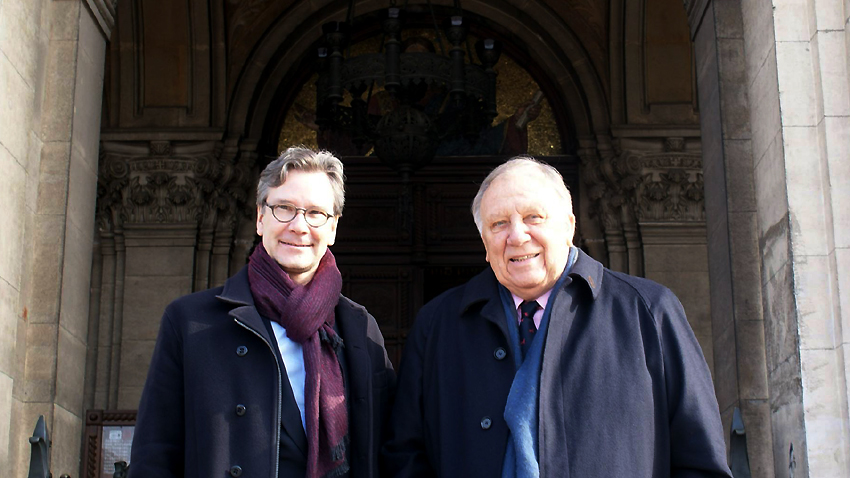The famous quotation of Graham Greene was the slogan of a compelling literary evening at the Sofia Sinagogue. Gregorij von Leitis and Michael Lahr read verses of a Nazi Germany concentration camp’s prisoners. The translation into Bulgarian had been trusted to students from Sofia high schools. The organizers wanted not only to remind of the past, but also to draw attention to the fact that life today is also full of hate speech. Vesela Vladkova spoke to both authors and to Valentin Pomakov, 12th grade, who had translated one of the poems.
 Von Leitis and Lahr came upon the verses by pure chance, in New York. They started to gather such works back in the 1980s, but the idea on literature readings across Europe was born after the assault on Charlie Hebdo, philosopher Lahr says:
Von Leitis and Lahr came upon the verses by pure chance, in New York. They started to gather such works back in the 1980s, but the idea on literature readings across Europe was born after the assault on Charlie Hebdo, philosopher Lahr says:
“The series of assaults is still continuing today. The second reason for our initiative is hate speech and the growing hatred towards minorities. I find it essential to show that hate is a lack of imagination. Just think how those artists opposed the hate of concentration camps with their verses, reflecting their imagination! Thus they prompted what we can do today – we shouldn’t give up or turn our heads away; we can counteract via beautiful art!”
Theatre expert von Leitis says that art is exactly that universal tool which can and must pass on to young people the ability to tell the difference between good and bad. “It’s not only the wallet that matters, we need food for our souls too,” says von Leitis, who was born during the war and a representative of the student protests’ generation of 1968 - an active participant in the rationalization of Germany’s Nazi past.
“Today’s youth is marvelous! Many of these young people are looking for answers, but can’t find them, as they don’t know where to search. I think that our literature program gives answers to them. The smart phone info is correct, but history can be reconsidered via some personal experience only. That is why our goal is to give them strength and the courage to voice their opinion to others, to speak up.”
Valentin Pomakov is a 12th grade student at one of Sofia’s German language high schools. At first he accepted the challenge to translate one of the verses due to personal reasons:
‘My experience with poetry is very humble. There was no way that I could resist the challenge to translate a verse instead of writing one. I have been studying German for many years and things couldn’t get more interesting, as the thing has been written in a very delicate manner and even with some irony and humor, taking into consideration the heavy subject. Of course that I see parallels with today’s world, but I try to ignore them, as I start feeling really tense.”
Michael Lahr lives in between Munich and New York and is alarmed to witness how racist words spoken from the highest political tribune of America and Europe are gradually turning into parlor speech.
“Politicians are now saying things which were considered unthinkable till recently. Furthermore – the masses begin to accept and like hate speech, thus opening the gates to racism. I hope that the current wave of protests against Donald Trump will establish new consciousness. I had hopes that it would happen during the Occupy movement, but alas – that didn’t happen,” Michael Lahr says in conclusion.
English version: Zhivko Stanchev
The opportunities for high-quality higher education in French in Bulgaria will be presented during an educational exhibition in Skopje. The event is part of the campaign "Continuons en français - let's study in French in Bulgarian..
April 8 is the day when Roma people around the world celebrate their identity. " International Roma Day is a time to show that we are part of the Bulgarian nation, of the European community and contribute to the development of local, but also global..
Every Bulgarian school abroad has its own story, and that of the Rodna Stryaha Bulgarian school in Cyprus began in 2015. Its foundations are built on the dream of a Bulgarian teacher - when one day Bulgarian children decide to return to their..
Cambridge Day 2025 - one of the leading events for English language teachers in Southeast Europe - takes place today at the Balkan Hotel in Sofia. For..
Students block the entrances to the Radio and Television of Serbia For 12 days now, students and citizens have been blocking the entrances to..
A new book "Bulgarian communities in Albania and Kosovo. Socio-political processes and demographic consequences (1913-2024)" was..

+359 2 9336 661
